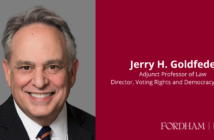On Nov. 6, Fordham Law School hosted a virtual symposium examining how lawyers’ mental health is affected by the interplay between legal practice and contemporary societal stressors—notably the coronavirus pandemic, racial violence and discrimination, and political polarization.
For the first time ever, the Fordham Law Review, the Neuroscience and Law Center, the Center on Race, Law and Justice, and the Stein Center for Law and Ethics partnered together to present such an event. The symposium featured four panels with social scientists, senior and junior legal scholars, a judge, and a journalist.
“This symposium tackled a subject of great importance from the perspective of the legal profession and legal ethics,” said Bruce Green, Louis Stein Chair of Law and the director of the Stein Center for Law and Ethics at Fordham. “Lawyers’ wellbeing influences the quality of their work; when lawyers and law firms fail to adequately address lawyers’ mental health challenges, professional misconduct sometimes follows; and good lawyers will leave the profession if lawyers find their work inordinately stressful.”
“A lot of people have written on this topic, but we created something different that reflected the changing times,” added Deborah Denno, Arthur A. McGivney Professor of Law and founding director of the Neuroscience and Law Center, who helped co-organize the event. “This symposium has enhanced the scholarship on this broad, contemporary, area by focusing on diverse and cutting-edge issues—including the mental health impact on women, LGBTQ lawyers, and lawyers of color.”
Addressing Timely Topics
Speakers in the first panel explored current scholarship examining attorneys’ mental health and factors that may contribute to substance use and abuse issues. They addressed several influences on the profession, including how attorneys learn to set aside their emotions, the adversarial nature of the legal system, the impact of COVID-19, and the overall lack of a work-life balance.
DePaul Law Professor Susan Bandes, for example, spoke about how the emotionless “think like a lawyer” mentality is harmful, not helpful. She argued it negatively affects lawyers’ psychology, affecting their legal reasoning and, ultimately, how they practice. Journalist Eilene Zimmerman also presented survey data that supported her claim that summer associates, mid-level associates, and budding attorneys are feeling more stressed out because of the pandemic.
Other panels discussed the particular obstacles attorneys of color face in the legal profession and what role lawyers play in advancing equality in society as well as potential constraints on those advancements. One specifically focused on the challenges women commonly face in the profession and the additional barriers Black women encounter that have been amplified due to the pandemic. Other speakers discussed challenges that LGBTQ individuals face, the effects of COVID-19 on the LGBTQ/HIV positive community, and what those circumstances reveal about health equity.
Sharing Scholarship and Stories
Jordana Confino, director of professionalism and special projects, moderated the final panel, which included a discussion of the prevalence of poor mental health among law students. By talking about the academic experience, the speakers also delved into what educators can do to start addressing that issue and how to lay the foundation for a healthier legal profession.
“Now, in the wake of COVID-19, there’s a heightened focus on bringing people together to the table and educating them about what they can do to fortify themselves against the stresses of the profession. But there has also been an overwhelming outpour of attention from people of the highest levels of legal academia recognizing the need for structural, as well as individual, changes to better support law students’ mental health and well-being,” Confino said. “This has the potential to help bring about enduring, systemic positive reforms within legal education and the profession.”
University of Massachusetts Amherst Professor Kathryne Young spoke about harmful cognitive trends that were evident from her interviews with more than 50 students from 36 law schools. Her upcoming paper discusses tension between the law school classroom and the reality of the outside world; dissonant messages students get about camaraderie and competition; and subtle manifestations of inequality in the classroom that send some people the message that they don’t really “belong.” Young argues that law schools, as institutions, unintentionally set the stage for these damaging cognitive trends, and will offer a few prescriptions in the paper for how educators can begin to reverse them.
Alex Bransford, law clerk for Judge Bernice Donald who sits on the U.S. Court of Appeals for the Sixth Circuit, shed light on the “segment of our profession that receives relatively little attention when discussing attorney mental health”—solo and small firm attorneys. Judge Donald, who also spoke at the event, later argued that treating all lawyers alike leads to an unequal playing field, wherein resources matter more than capabilities.
Confino applauded the vulnerability of the speakers who shared their very personal stories about their mental health along with their legal scholarship. “It wasn’t your typical academic conference session that simply presented data and statistics regarding mental health issues,” Confino pointed out. “These panelists helped bring down the stigma, making it ok to talk about this in the academic sphere.”
The symposium speakers’ articles will be published in the May 2021 volume of the Fordham Law Review.






